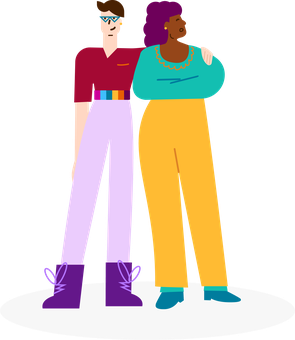“I’ve always been very self conscious, always had a lot of self-esteem issues.” Says Matt, “in school, as much as LGBT got was you were straight or gay. That was it. I always felt I was queer but never felt I fit in those categories.”
When he started attending college, Matt met trans people for the first time. “I sat and talked about it with them and things started to make sense” he says, “I started trying out new names in secret at first, I wasn’t sure how to tell people.”
At the time Matt was attending Single Homeless Action Initiative Durham’s (SHAID) weekly LGBTQ+ young person’s group Freedom Zone in Durham. Sharon Mcilavaney, who runs the group, is the learning mentor and LGBTQ+ champion at SHAID. She says that the charity decided to open up a safe space for young queer people because “family rejections still happen a lot, meaning these young people are more likely to be chucked out of the family home.”
These experiences ring true with broader statistics. A survey conducted by the charity AKT, who work towards safe homes and better futures for LGBTQ+ young people, found that half of this group feared that expressing their identity to family members would lead to them being evicted. For young trans people, the problem seems to be more acute, with AKT’s research finding that two thirds of trans young people said they were stopped from expressing their identity by their family, while 74% who have experienced homelessness said their family members repeatedly belittled them to the extent that they felt worthless before they became homeless.
SHAID groups run across the Durham area, both online and in person, with the groups continuing through the pandemic. They are open to young people who identify as LGBTQ+ as well as ‘allies’, often friends who are offering support. Matt describes how the group helped him understand that he was trans, as well as giving him support and advice to help him tell his family.
Mcilvaney says this kind of support is vital as “if the family find out by accident it can often be a big shock, leading to some raw emotions.” Thankfully Matt’s mum and sisters were supportive although he says his “nana took a while to come round.” But he has heard of others who have not been so lucky, while Mcilvaney says that the groups see an increasing number of young trans people threatened with homelessness as “the trans rights movement is where gay rights was at least 20 years ago.”
At the other end of the country from SHAID, the Kent based homelessness charity Porchlight run an NHS funded project called The BeYou Project, which connects young people in Kent and Medway who are lesbian, gay, bisexual, trans, non-binary or are questioning their sexual orientation and / or gender identity.
Graysen Whittaker is the LGBT+ Service Development Manager at Porchlight. They say the charity decided to start the project following a research report conducted by the University of Kent which found a disproportionate number of young people experiencing homelessness in the county identify as LGBTQ+.
Whittaker says that “unfortunately homophobia within households is very real.” They also say that young people often “experience internalised homophobia leading to coping mechanisms such as self-harm or substance misuse which can also lead to family breakdowns.”
Lauren Page-Hammick is the Youth Homelessness Manager at Homeless Link and recently co-authored guidance on supporting young trans people alongside AKT. She says that not having safe spaces to talk about how they feel leads many young trans people to “supress their gender identity or expression due to fear of rejection.” She says this “goes beyond the family home, with young people unable to express their identity in school and work, often having a big impact on their mental health.”
Whittaker agrees and says the BeYou project’s core aim is to “help people become their authentic selves because they are a lot safer and happier that way.” However, supporting young people to achieve this isn’t always easy. The BeYou project’s groups are non-judgemental open spaces where they make sure every person’s identity is respected, but other services are often not so progressive.
Whittaker cites one example of a young transgender man with autism and support needs who was having suicidal thoughts. The man was misgendered by members of the mental health crisis team, meaning he felt too uncomfortable to see them again. These experiences are common place, with AKT’s research finding that 43 per cent of young trans people who accessed support from a local authority or charity when homeless said they had experienced discrimination or harassment due to being transgender.
Page-Hammick from Homeless Link says the housing sector is also guilty of not recognising young trans people’s identities. “Gender policing when trying to access emergency housing is often reported amongst trans people” she says “this experience will often lead them to return home, sleep rough or fall into ‘hidden homelessness’ situations.” These predicaments can lead to young people putting themselves at risk. AKT’s research found 17% of LGBTQ+ young people felt like they had to have casual sex to find somewhere to stay while they were homeless. As one young person interviewed as part of the research said: “It’s difficult to be the queer person and also the homeless person.”
So, what can homelessness services do to be more inclusive of young trans people? Page-Hammick says “creating safe and welcoming environments is an important first step.” This can be through visual cues such as representative posters including the pride flag, as well as asking a young person their pronouns when first accessing a service, apologising if they use a wrong pronoun and challenging others who don’t use the person’s correct name or pronoun. Mcilvaney from SHAID says broader organisational changes can also help. For example, SHAID recently made all their toilets gender neutral. Page-Hammick also stresses that “trans people’s experiences are not uniform. Staff should educate themselves on different trans identities and consider the barriers that further marginalised groups may face.”
Whittaker agrees and cites the need to give young people a voice in the service. All major organisational decisions in the BeYou project are run by a steering group called the Gay Agenda, with the name chosen by the steering group themselves. They also believe it is important to educate other organisations and services where possible, with the BeYou project recently employing a Training Lead to go into schools to talk to both students and teachers about trans issues.
Whittaker also says it’s important for organisations to understand that “the needs of trans young people are often very different to LGB young people.” They say employing people from the community can help to understand these distinctions - “I’m trans myself so when a young person is, for example, dealing with the gender identity clinic I can draw on my experiences to help them.”
At its heart, both Page-Hammick and Whittaker stress that services need to recognise that being a young trans person can be daunting. “We’ve seen bad things happen on tv or in films” Whittaker says “there’s always a niggling feeling that someone will reject you, so services should go above and beyond to make people feel comfortable being their authentic self.”
---
Homeless Link and AKT’s joint guidance on how homeless services can be more inclusive and support young trans people is available here.

